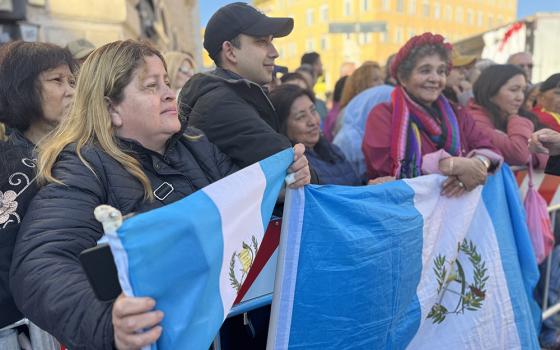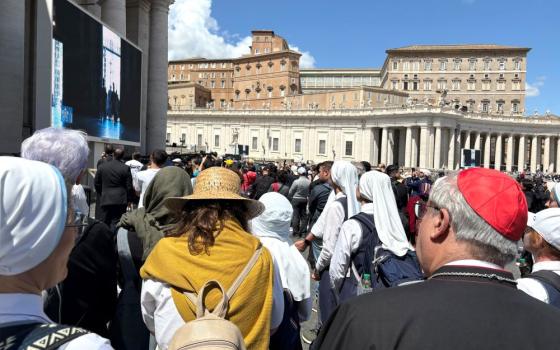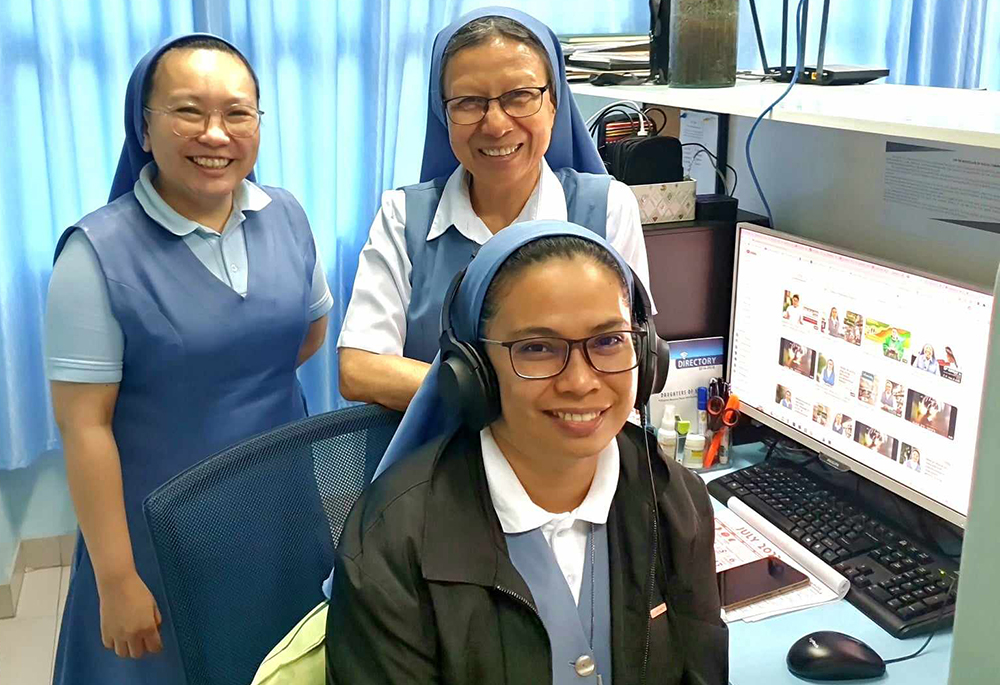
Pauline Sr. Pinky B. Barrientos (standing on right) with Sr. Parichat Jullamonthon (standing on left) and Sr. Josephine Tablante (seated in front). Jullamonthon and Tablante are in charge of the congregation's media production studio at the provincial house and communication center building. The provincial house and communication center building is located across the street opposite the central house. (GSR photo/Oliver Samson)
Sr. Pinky B. Barrientos, a member of Daughters of St. Paul, was a junior nun when she and other sisters joined the massive crowd on EDSA (Epifanio de los Santos Avenue) in 1986.
The late Manila Archbishop Cardinal Jaime Sin had just appealed to Filipinos in a broadcast statement to go to the military and police headquarters along EDSA to back the defense secretary and the armed forces chief who just withdrew their support of President Ferdinand Marcos. Barrientos and other sisters led prayers in front of military tanks and heavily armed soldiers who were ordered to disperse the crowd. The bloodless EDSA revolution on Feb. 22-25, 1986, put an end to the dictator's 21-year rule, restoring democracy and freedom of the press.
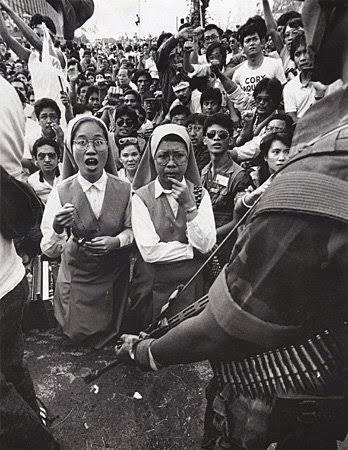
An iconic photo of two Daughters of St. Paul kneeling in the middle of civilians preventing the movement of military tanks on EDSA. The photo was taken by Pete Reyes, first published in Manila Times, and reproduced in other newspapers reporting the bloodless revolution. (Manila Times/Pete Reyes)
Barrientos spent most of her apostolic life working in radio, television and the editorial department of the congregation's publishing house. She also spent eight years working in the media office of the Catholic Bishops' Conference of the Philippines, where she served as a writer, editor and assistant director. She was also appointed local superior of the congregation for one term and provincial councilor for two terms.
The massive, coordinated and well-oiled disinformation campaign demonizing the church and leaders during the 2016 general elections tore through her heart like a barbed arrowhead. The disinformation campaign continued into the next elections.
Global Sisters Report: As a media practitioner, how did you feel when most of the Filipinos seemed to believe the fake news and reject legit news during the 2016 national and local elections? It was the very first time in the history of the Philippines.
Barrientos: I felt sad. It's so sad that some people would rather believe in unfounded news than the real news. I know people close to me who have fallen victim to fake news.
I also felt challenged as a Pauline sister because of our communication ministry. As Daughters of St. Paul, we use media and other means of communication to evangelize and communicate the truth of the Gospel. There is a lot of work to do to form the mind of people in their use of the media and in consuming information. There is the need to be more critical and discerning.
Another reason why some people are easily swayed by fake news is because they have little foundation — or maybe none at all — of the Christian faith. If we truly believe in Jesus, whom we encounter in the Gospel, then we won't believe anything contrary to what the Gospel says. The Gospel is truth because it is about the life of Jesus, hence the antithesis of disinformation, which is the work of evil.
Fake news and other forms of disinformation are works of the devil. They divide people, communities and even nations. They lead people astray and destroy their dignity.

Pauline Sr. Pinky B. Barrientos speaks during an interview in an open cottage at Daughters of St. Paul's central house in Pasay City, Philippines. (GSR photo/Oliver Samson)
The church and its people were demonized by those who had been manipulated into believing fake news and other forms of disinformation. Many still think today that that fake news was true. What do you think the media and the church should do in response?
Let's talk first about what the media should do. It's sad that the Philippine media, maybe not all, but a big part of it, choose not to refute fake news and just keep silent on it.
It is easy to mislead people. Lies can be constantly hammered into their consciousness. The disinformation targeting the church and other personalities was well organized and well planned since it had been going on for years even prior to the elections.
On the part of the church, it's a great challenge. There are instances when the church, or religious leaders, have to speak out and correct the lies spread against them. But there are also instances when it's wiser to not give too much importance to the matter when it's obvious the intention of the person is to gain media mileage.
A group of us sisters once joined a rosary procession. It passed along Roxas Boulevard to the Manila Cathedral with participation by religious and many laypeople. A day after that event, a photo of us Daughters of St. Paul holding rosaries during the procession juxtaposed with poor people begging by the roadside was published on social media. The photo caption was a criticism of the church and of us nuns, because we were in the photo, like we were hypocritical and doing nothing to help the poor. We wondered if we should respond to it. But we decided to not give attention to that, because it's very obvious that the person was just seeking attention and media mileage. Some youth groups from the Archdiocese of Manila rose to our defense. The groups published several photos of our sisters helping people after calamities, especially after Super Typhoon Yolanda. In the end, that person apologized.
This is what I mean by choosing when to raise our voice and when to just let things pass. But as church people, we have the great responsibility to fight disinformation by always pointing out the truth with facts.

Pauline Sr. Pinky Barrientos (standing) and Sr. Christine Sundin inside the Pauline bookshop. The bookshop is located at the ground floor of the provincial house and communication center building. (GSR photo/Oliver Samson)
Rappler's Maria Ressa, a Nobel Peace Prize awardee for defending press freedom, is still hated by people who believed fake news purveyors that the media and the journalist were liars. How can the media and religious leaders make them realize their mistake?
The media have to work hard to prove they are not paid apologists for people in power, either in the government, or in the business sector. The media must be at the service of the people by providing them with the right information that could help them in making right decisions.
Reputable journalists, like Maria Ressa, will always have enemies. There will always be people who will hate those who speak and fight for the truth, either because they are misinformed, or paid to deliberately spread hate against good journalists to put them down.
On the part of the religious, we have to make use of our ministries to form, instruct and catechize the faithful on the proper use of social media. It's important to form the mind, to learn how to be discerning and analytical of the messages and information that the media feed us. Not everything we watch, read and hear is true.
Advertisement
What do you wish to tell ordinary Filipinos still fighting disinformation today?
Don't give up. It's everyone's responsibility to fight disinformation. Maybe not all of us have the time to be always present on social media to combat fake news and other forms of disinformation. But we can do our part even in small ways. Perhaps we can do it within our family, in our community, and in our groups of friends, one step at a time.
You might say it's easier said than done. True! I have personally experienced it. I find it unbelievable that a person would continue to believe in false news even if you have already presented facts refuting it.
One step at a time. It's also true that many are open-minded enough to accept the fact that they had been misled. What is important is that when we point out the truth, we do it in a loving way so as not to destroy our relationship with one another within our family, or community.
What do you wish to tell young people so that they would not fall victims to disinformation?
Young people are very adept in the use of social media. I believe in their capability to distinguish true from fake news. I would encourage them to use their God-given talents for building society. They should not be used by people with bad intentions, instead always uphold the truth.
The youth of today, especially those actively engaged in social media, can find in Blessed Carlo Acutis a role model. Carlo Acutis was a typical teenager who was very much interested in the use of technology, a computer wizard. But even if he was interested and had excelled in the use of technology, he did not allow it to control his life. But he used his talents and knowledge to draw fellow teenagers to God.
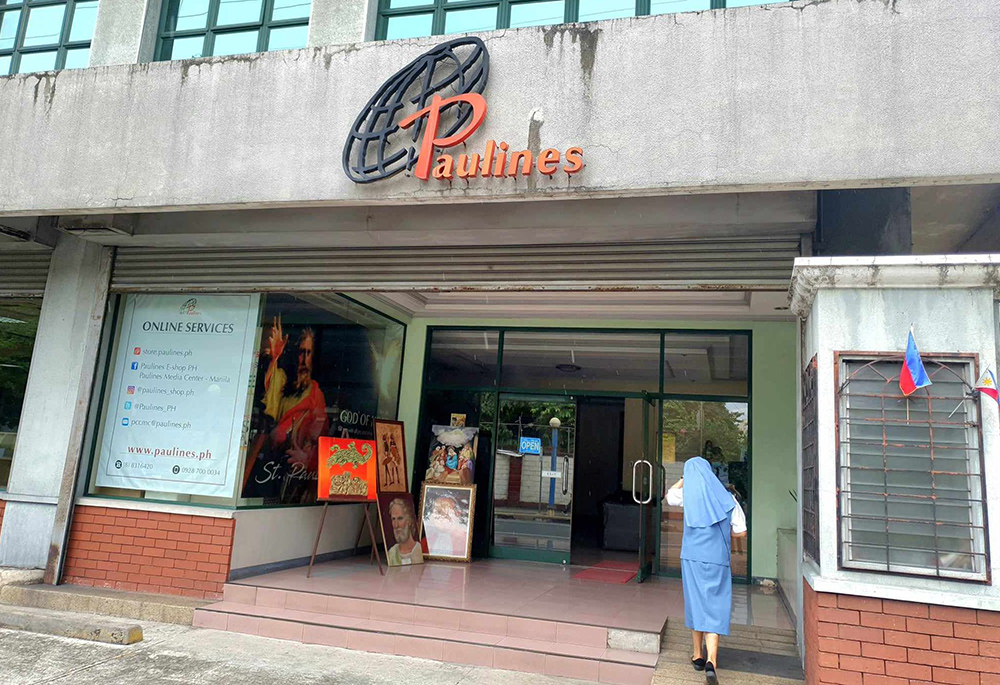
Pauline Sr. Pinky B. Barrientos crosses the street from the congregation's central house to the provincial house and communication center building. (GSR photo/Oliver Samson)
How can one distinguish between false news and legit news?
I think one effective way is to check the source. Is the source legit and balanced? Or it's just anyone or a group posing as journalists. It's our responsibility to verify the legitimacy of the source and the accuracy of the stories. There are fact-checking tools on the internet. Some news outfits also do fact-checking for their audience.
How can you tell if an aspiring leader is resorting to disinformation to manipulate the opinion of the public in favor of his bid for elective public office?
Listen closely to what he says. Are his words aligned with his actions and lifestyle? There are people who have mastered the art of lying that they can easily say something to the point of contradicting their true selves. And they can do that with a straight face.
I'm praying and hoping for the day when we have already learned the lessons from the mistakes of electing undeserving people and start electing the truly deserving ones — those who will put the welfare of the country and people ahead of their own.
Some legit media practitioners supported the obvious beneficiaries of the massive, coordinated, and well-oiled disinformation campaign. What do you wish to say on this?
It's truly a great disservice to the people if there are media practitioners who support candidates who are obviously benefiting from fake news and other forms of disinformation. Journalists should be aware at all times that their first responsibility is to report the truth to the people, so that the people will be guided in their decisions.





